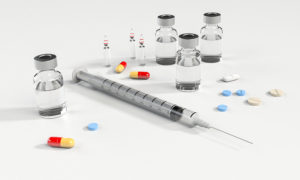The Price of Life
 For many people, allergies only represent a mild seasonal annoyance. But 1 in 50 Americans experiences life-threatening allergic reactions. I’m one of them. I had thought that I was allergic to certain foods for years before I had taken any sort of allergy test. Once I was tested, the dangers that allergies presented were fully laid out to me. I was required at all times to carry an EpiPen, which contained just .3mg of epinephrine — a drug that relaxes the muscles in your throat, allowing you to breathe if you have an allergic reaction. Thankfully, my family and I are able to afford Epipens with our insurance plan — allowing us to only pay a fraction of what the total price is. This way, I feel safe and secure wherever I go. But many American families don’t have adequate health insurance to help pay for these life-saving drugs, having to pay the full for each set of medicine.
For many people, allergies only represent a mild seasonal annoyance. But 1 in 50 Americans experiences life-threatening allergic reactions. I’m one of them. I had thought that I was allergic to certain foods for years before I had taken any sort of allergy test. Once I was tested, the dangers that allergies presented were fully laid out to me. I was required at all times to carry an EpiPen, which contained just .3mg of epinephrine — a drug that relaxes the muscles in your throat, allowing you to breathe if you have an allergic reaction. Thankfully, my family and I are able to afford Epipens with our insurance plan — allowing us to only pay a fraction of what the total price is. This way, I feel safe and secure wherever I go. But many American families don’t have adequate health insurance to help pay for these life-saving drugs, having to pay the full for each set of medicine.
Mylan’s EpiPens still remain the most dominant brand. Without insurance, a set of 2 injectors of epinephrine costs $600. Another brand, Auvi-Q, whose injector gives instructions through a speaker, costs $6000. These prices without insurance can devastate a family’s income, and make people choose between having an EpiPen or having food to eat. The Food and Drug Administration (FDA is taking steps to help with this problem, approving a generic form of the EpiPen in August 2018, and allowing Americans to buy them at a lower price, at around $100. Luckily many families can still turn to the Generic brand, saving themselves hundreds of dollars and lessening the impact these necessary costs have on their lives.
For other Americans who are dependent on different drugs for conditions other than allergies, generic brands still need to be developed. According to the Center for Disease Control, insulin is needed by 8.3% of the US population, and its price has been rising steadily.
According to Journal of the American Medical Association, in 2016 a person using insulin spent $5705 on it alone. Without any generic competition, many people dependent on insulin (such as people with diabetes) who cannot afford the payments have to resort to rationing out what they have. This is very dangerous and leads to people not being able to keep themselves healthy. The FDA is attempting to develop a generic brand of insulin is being developed, but insulin is very complex, making the procedure difficult.
Many people see that these issues are very serious, and affect millions of Americans daily. Unlike epinephrine, which only has to be used in emergencies, insulin has to be taken to stay healthy and survive. A drug needed for certain people shouldn’t be locked behind a paywall or force people into uncomfortable situations. The FDA and many other government, private, and charitable institutions are trying to find ways to prevent these essential drugs from being too overpriced. Hopefully, these people can push against these rising prices, to help themselves and every generation after them live better and more comfortable lives.
-Owen
Sources:
- https://www.sciencedaily.com/releases/2016/04/160405122030.htm
- https://diabetescaucus-degette.house.gov/sites/diabetescaucus.house.gov/files/Congressional%20Diabetes%20Caucus%20Insulin%20Inquiry%20Whitepaper%20FINAL%20VERSION.pdf
- https://www.fda.gov/news-events/press-announcements/statement-fda-commissioner-scott-gottlieb-md-agencys-continued-efforts-bring-competition-insu
- https://www.fda.gov/news-events/press-announcements/fda-approves-first-generic-version-epipen

